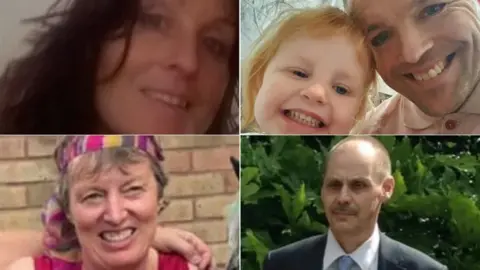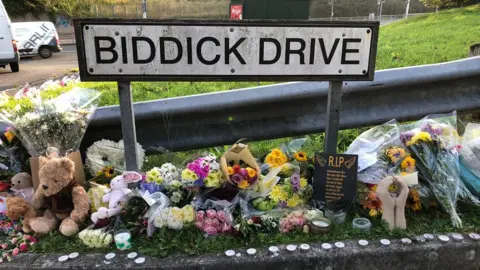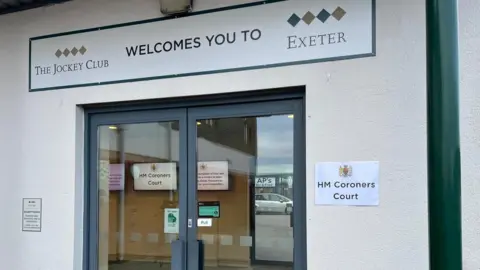Plymouth shooting: Police 'should have sought' GP's opinion for gun licence
 Unknown/The Anchorage/Handout
Unknown/The Anchorage/HandoutPolice should have obtained a GP's medical opinion before granting the licence that allowed Jake Davison to own the shotgun he used to kill five people in Plymouth, an inquest has heard.
Davison, 22, used his legally-held shotgun to kill his mother Maxine, 51, and four others including a young girl in Keyham in August 2021.
He then turned the weapon on himself.
His licence was revoked in 2020, but returned weeks before the killings.
Three-year-old Sophie Martyn, her father, Lee, 43, Stephen Washington, 59, and Katherine, also known as Kate, Shepherd, 66, all died on the evening of 12 August.

Ch Supt Roy Linden, of Devon and Cornwall Police, told the inquests into the deaths of Davison's victims, that officers should have gained medical evidence about Davison when considering his application for a shotgun licence.
He told the inquest: "Opinion should have been sought from a GP."
He said according to 2017 Home Office guidance, officers "may reach their own conclusions as to the significance of the medical evidence supplied" if they cannot obtain it.
Assaulted two teenagers
Davison applied for a shotgun certificate in July 2017, with one issued by Devon and Cornwall Police in January 2018 which was valid for five years.
The force revoked Davison's licence and seized his shotgun in 2020, but returned them in 2021 - weeks before the killings.
The inquest heard Davison declared that he had autism on his application, and gave consent for his GP to share information with police about his medical history.
However, Davison's GP refused to provide an opinion to police assessing whether Davison should be issued with a shotgun certificate.
Mr Linden previously said the GP's refusal to provide information for Davison's application was "not rare" at the time, but acknowledged there was no policy in place for what to do when that happened.

The inquest also heard officers in Devon and Cornwall were not given effective training to process gun licence applications at the time.
Ch Supt Linden was questioned about the training given to firearms enquiry officers (FEOs).
They gather the information necessary to assess the suitability of firearms and shotgun licence applicants.
'Absence of effective training'
Ch Supt Linden said FEOs used a form to show evidence they had completed certain tasks, such as looking at the suitability of referees and that the "risk matrix" had been looked at.
Dominic Adamson, representing the Martyn, Washington and Shepherd families, asked whether it was correct that in effect a firearms inquiry officer's training was "here's a copy of the risk matrix, check this database, it's easy, away you go".
Ch Supt Linden said: "I wouldn't put it in those terms. There was an absence of effective training, I would say."
He added: "The process itself is linear and straightforward."
Mr Adamson said in other walks of life there would be training and then a test to check competence and added: "There's nothing of that nature in place for firearms enquiry officers."
Ch Supt Linden said: "At a national, regional and local level, no."
Mr Adamson said the need for training was a "theme" of the Targeting the Risk report produced by His Majesty's Inspectorate of Constabulary in September 2015.
That report concluded there was a need for change and if there was not, "there will be another tragedy".
Ch Supt Linden said the need for training "could not have been clearer" in the report and agreed that "years later" nothing had been achieved.
Supt Cara Sherwood, who worked in the force's operations department from September 2019 to September 2021, was asked how significant a decision it was to seize a licence holder's weapons.
She said it was a "necessary step" where licence holders came to police notice and it would be appropriate in cases where one had committed a violent assault.
In those circumstances "I would not return a weapon or it is a high risk decision", she said.
The inquest continues.

Follow BBC News South West on Twitter, Facebook and Instagram. Send your story ideas to [email protected].
